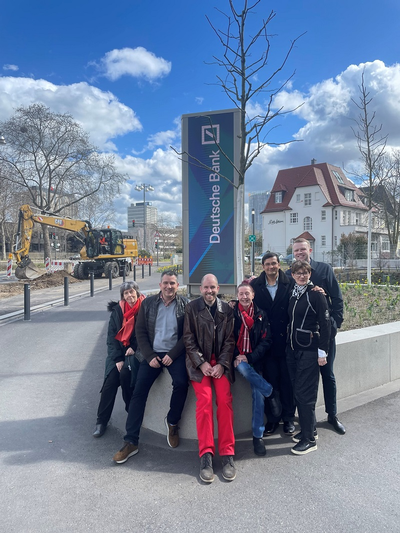13 July 2023
The ISO 20022 migration weekend of 18–19 March came and went with minimal disruption for clients. Behind the scenes, however, a major internal project was in progress. flow reports on how Deutsche Bank tackled the Herculean task, and the lessons learnt along the way
MINUTES min read
11,000 banks worldwide are migrating to ISO 20022 in 2023
Over the past five years, banks, corporates and other major financial stakeholders have been hard at work preparing for the migration to ISO 20022 – the new global messaging standard for high-value and cross-border payments. The project, which provides the foundation for enhanced customer experience, streamlined compliance procedures and a host of innovative services, has been billed as the most impactful payments industry undertaking since the introduction of the Single Euro Payments Area (SEPA) more than a decade ago.
The enormity of this change cannot be overstated; the entire payments industry, including 11,000 banks worldwide, is being rewired so that valuable payment data can be captured in the new fields within the ISO 20022 standard and serve multinational corporate clients and payment services providers – and their customers – with improved speed, information, security and financial crime prevention.
Following various delays along the way, the ISO 20022 era has now successfully begun.
The journey begins
Over the ‘migration weekend’ of 18–19 March 2023, the global banking community started the process of moving to the new standard. This date marked a significant milestone not only for the correspondent banking space, but also for communities in Australia (RITS), Canada (LYNX), Europe (EURO 1 and T2) and New Zealand (ESAS), whose Payment Market Infrastructures also migrated to the new standard for high-value payments.
As part of this transition, the European Central Bank’s Target 2 market infrastructure took a step forward in its consolidation journey (RTGS, TIPS and Securities) and introduced central liquidity management, resulting in a completely new account structure being needed for Deutsche Bank AG Frankfurt and all EUR-currency branches.
Migration activities continued on 19 June 2023, when the Bank of England (BoE) began its transition process. From this date, all direct participants of CHAPS – the BoE’s high-value payment system – needed the ability to receive enhanced ISO 20022 payment messages using only the enhanced XML message schemas. The BoE is also working on a new RTGS core settlement engine, which is set to go live in summer 2024.
“The introduction of ISO 20022 has been a massive change for Deutsche Bank”
Further migrations, such as those in the US, lie ahead, as well as the end of the coexistence period in the cross-border space in November 2025, but now is an opportune moment to reflect on what has gone well so far, and to identify lessons for the future.
A Herculean task
“The introduction of ISO 20022 has been a massive change for Deutsche Bank, not least because we took this opportunity to architecturally transform internal payment processing front-to-back, to add business value and set up the bank for the future,” says Antonios Tzouvaras, the bank’s ISO 20022 Business Tribe Lead.
“As with any project of such magnitude, the post-migration days have been no walk in the park, with teams continuing to work around the clock to limit the risk for negative cash management and client implications,” adds Christopher Gardner, ISO 20022 Technical Tribe Lead, Deutsche Bank.
The project involved hundreds of colleagues across numerous locations and functions, including technology, business, operations, treasury, AFC, country managers and more. For the migration weekend, Deutsche Bank established its #OneTeam onsite command centre with operations, technology, data and innovation (TDI), product and treasury in Eschborn, Germany, working borderless with strong collaboration front-to-back across all functions and a proactive flow of information between local cash operations and the central hub.
In summary, Deutsche Bank accomplished the following:
- Introduced changes to more than 100 impacted applications within the bank
- Performed high-volume testing with more than 20 industry partners before the migration start
- Implemented the new standard ahead of the official start date as part of the “early adoption phase”
- Trained more than 3,000 colleagues and implemented external communication channels, including a series of guides, dedicated website, video tutorials, webinars, blogs, etc.
- Migrated 36 Deutsche Bank countries to the new Swift ISO 20022 messaging standard.
“The industry migration to ISO 20022 has been a story of success”
Post-migration learning points
“Looking back to 2019, when the project was first conceived, to where we are now, having processed millions of client transactions in the new standard, it is fair to say that the industry migration to ISO 20022 has been a success,” says Gardner. “That is, however, not to say that it was without a few teething issues in the early days.”
He explains that although the switch-over was smoother than anyone in the industry might have expected, the remaining issues have become lessons for the future:
1) Unexpected data received:
Incorrect formatting of incoming payment instructions hindered straight-through processing of transactions, although quick diagnosis of the problem and recapturing of such payments has proved helpful.
2) Interoperability concerns:
Given that ISO 20022 will be used alongside the legacy messaging standard until November 2025, the bank can handle both standards. However, the procedures for these two standards are not interchangeable, leading to various issues in payments processing. Industry alignment and collaboration on this topic has been important for the creation of workarounds.
3) Internal processing issues:
Complexity of infrastructure has created several challenges in payments processing, but the end-to-end view of a transaction across the systems has proved invaluable in this exercise.
Looking forward, further migrations need to be addressed, such as the migration of The Clearing House’s (TCH) high-value payment system CHIPs in April 2024. Further focus is also needed on the implementation of the additional message types and processes to complete the transition, which will be tackled on the SWIFT network later this year or in 2024.
“After the huge initial implementation effort, now is the time for institutions and market participants to continue to pick up the pace by adopting enhanced data requirements and implementing new capabilities,” Tzouvaras concludes. “Only then can the full promise of ISO 20022 be unlocked.”

Deutsche Bank’s #OneTeam Target 2 celebrate the successful ISO 20022 migration in Bonn: (left to right) Sabine Kunz, Antonios Tzouvaras, Wolfgang Happe, Jutta Rosar, Swapnil Wipat, Aranka Kruse, Thibault Stouten



